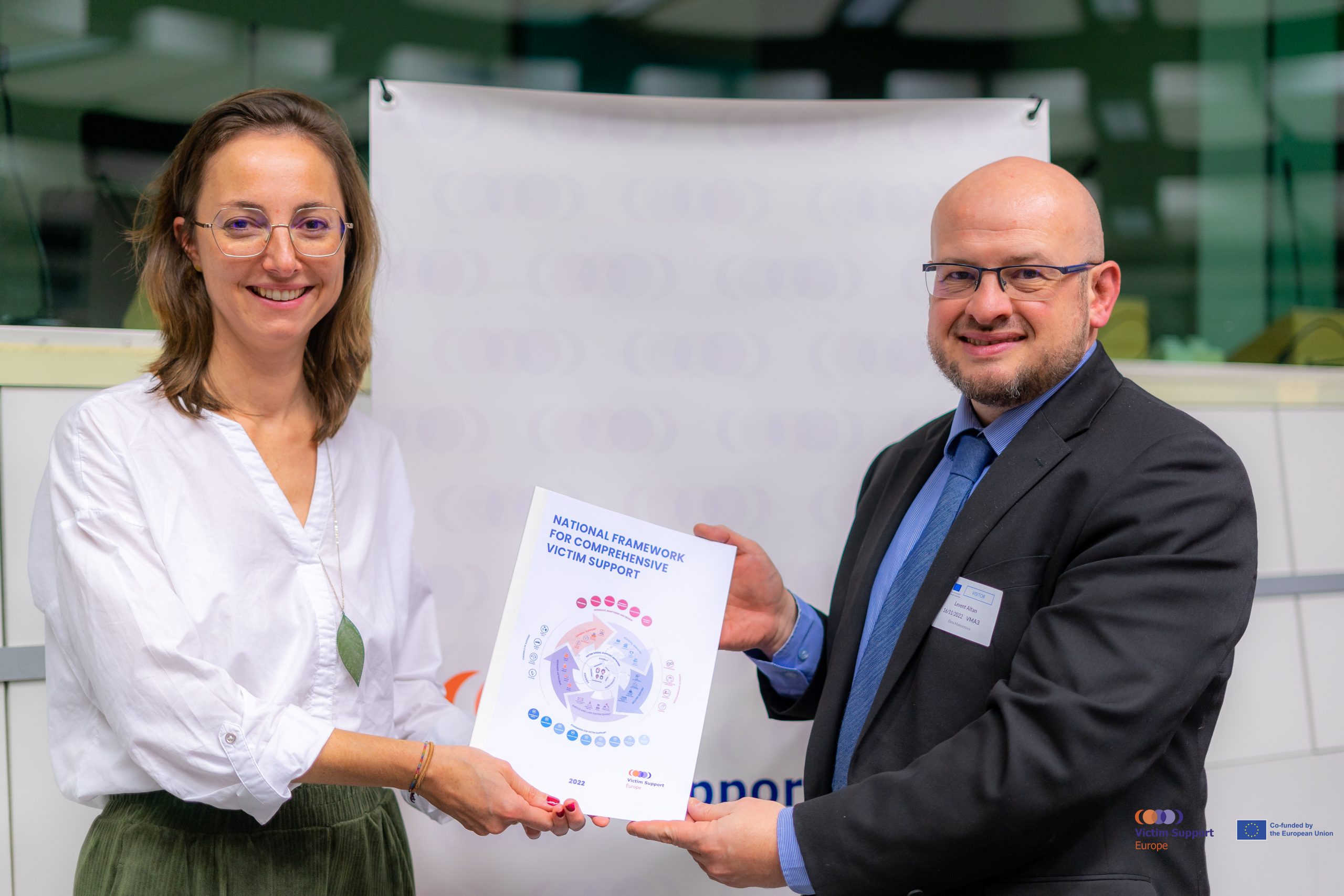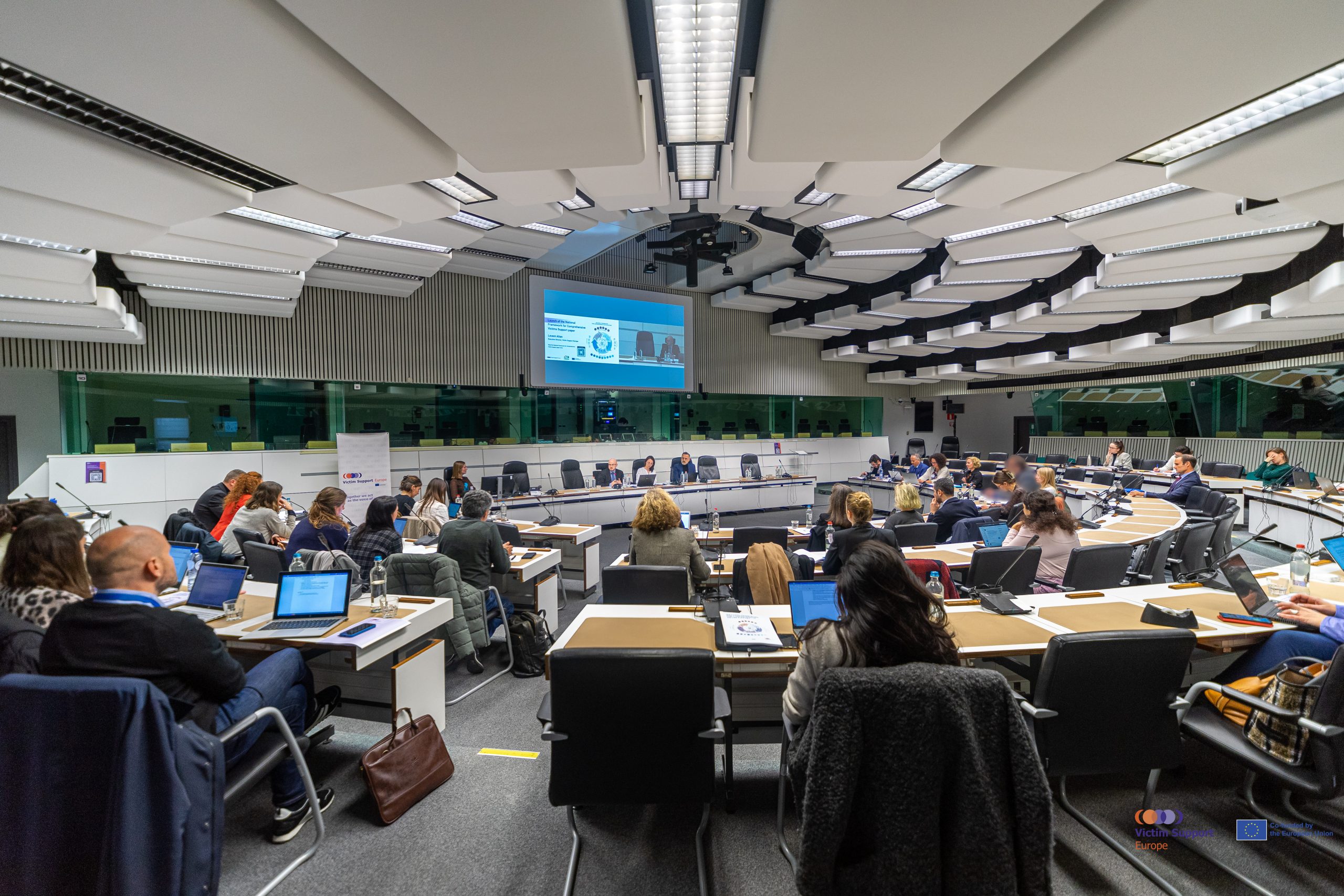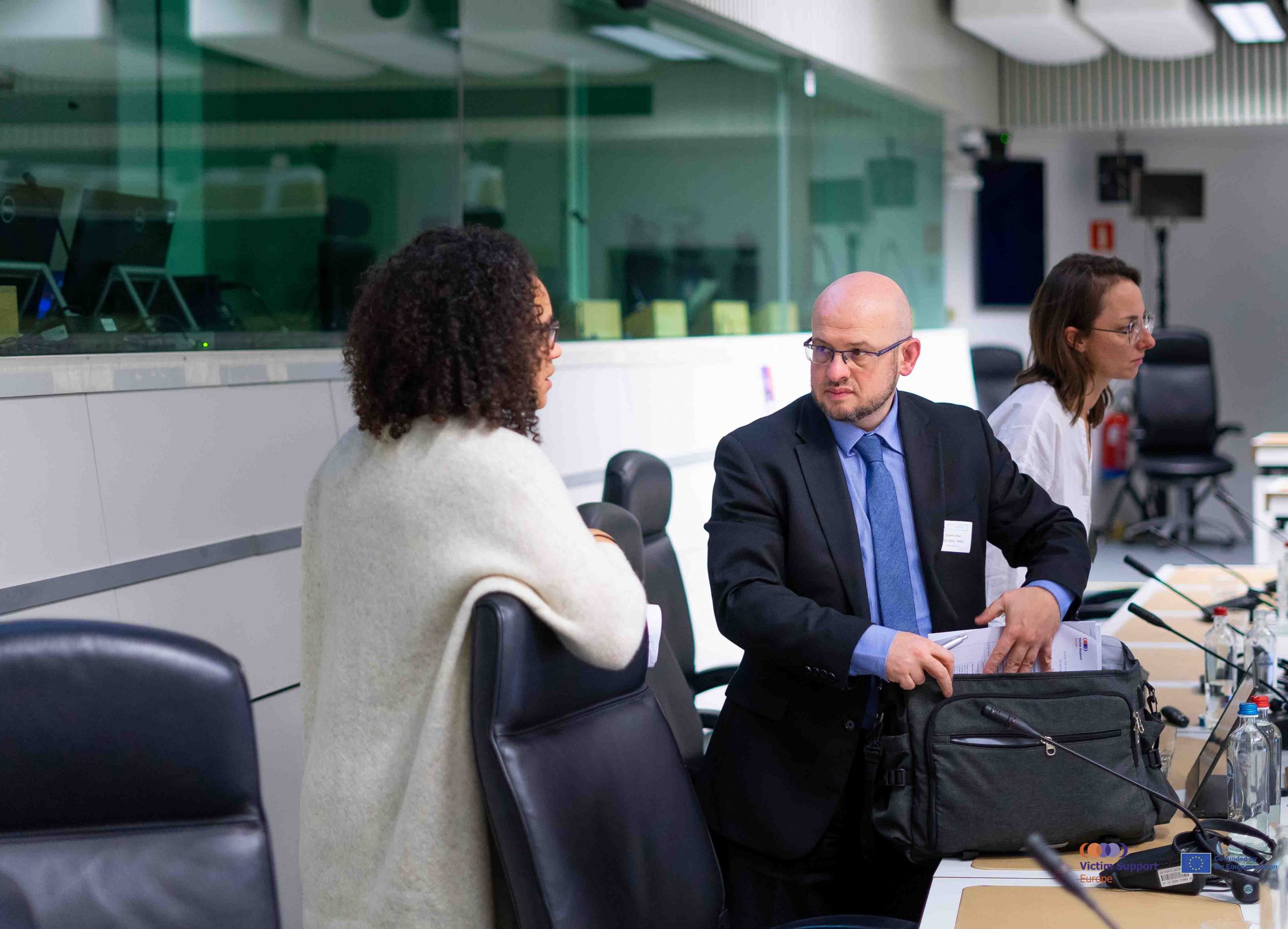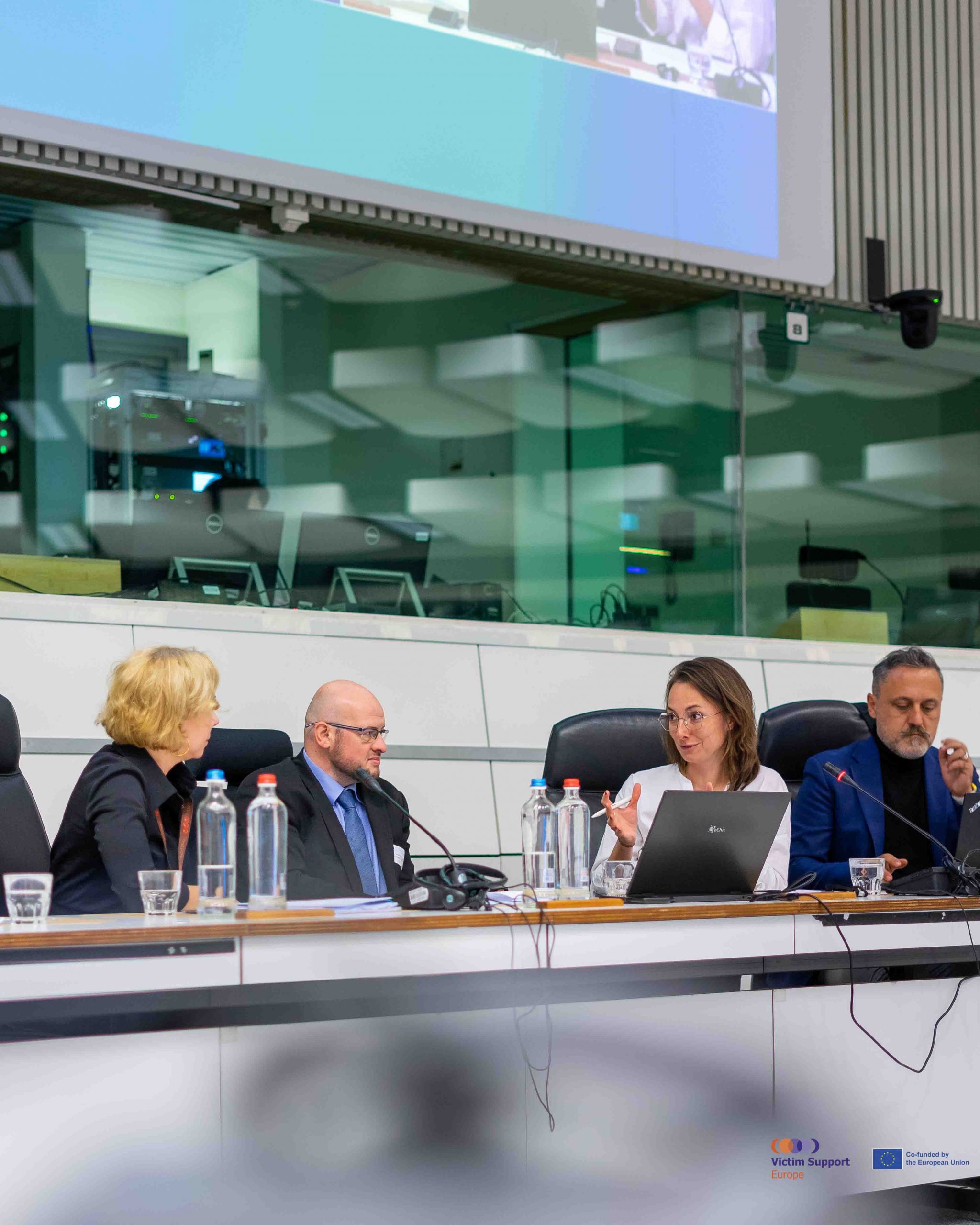Shaping Victim Support Together
Wednesday, 11 January 2023
You’re fast asleep at home when you wake to the sound of footsteps. With your heart pounding, you slowly open the bedroom door. As you switch on the light, you gasp in terror – face to face with a burglar. He starts yelling at you. Without warning he swings a bat. Weeks later, your physical injuries are fading, but you still startle awake, sweating in the middle of the night. Thanks to CCTV, the police have caught a suspect. But now, you have to testify in court. The memories flood back, your heart races. You don’t know what to expect, you’ve never been to court. You would never have dreamt this could happen to you!

Interview with Levent Altan, Executive Director of Victim Support Europe (VSE), and Saskia Bricmont, a Greens/EFA Member of the European Parliament
Crime can affect any of us, at any time and 75 million people in the European Union fall victim to serious crime every single year. So, who is there to help? What help do victims need and why should 2023 be a pivotal moment for those of us who have been – who are or may be a victim – or who know a victim?
We spoke to Levent Altan, Executive Director of Victim Support Europe (VSE), and Saskia Bricmont, a Greens/EFA Member of the European Parliament, to find out how they are working together to build a new ecosystem which could transform victim support across the European Union.
Levent Altan has been the VSE’s Executive Director for the past 8 years. His civil service career began in the UK Ministry of Justice, then as a national expert he worked at the European Commission where he was introduced to the world of victims’ rights and the family of victim support organisations.
As an umbrella network of 70 organisations, which annually support more than two million victims of crime, over the past 30 years Victim Support Europe has been fighting for victims’ rights. In the run up to the upcoming revision of the EU Victims’ Rights Directive, VSE has been writing a series of papers on support, safe justice and effective communication.
Saskia Bricmont has been a Greens/EFA Member of the European Parliament since her election in 2019, she is a member of the influential Civil Liberties, Justice and Home Affairs Committee and is the Co-Chair of the Intergroup on Children’s Rights.
Following VSE’s latest publication, the ‘National Framework for Comprehensive Victim Support’, we talked to Levent and Saskia to find out how the EU is transforming the treatment of victims of crime, how its legal statutes support victims of crime, and how we – as individuals – can help victims of crime.

Levent – why has the ‘National Framework for Comprehensive Victim Support’ paper been presented to Members of the European Parliament at this time?
To answer this, I think will be helpful to explain what victim support is and why it matters.
Imagine your sister, or son, or colleague was attacked. They tell you they’re terrified to go out. They wake up every night with nightmares. There’s going to be a court hearing and they’re scared of seeing their attacker, they don’t really understand what will happen next. Maybe they’ve been interviewed by the police and they don’t like how they were treated, maybe an officer suggested it was their fault. Victims face these and many other issues after a crime – they may be left physically, emotionally, or financially affected, yet their ordeal may only be starting. As victims of crime, they may be party to not only a police investigation but also a court trial.
Being a victim of crime can be life-changing, traumatising many victims, who struggle to cope or who become lost in complex judicial proceedings. Such trauma can lead to substance abuse or family breakdown, while life-long trauma may leave victims unable to complete their education or even to work.
Support, as a victim of crime, is crucial to your well-being, professionally trained victim support workers are there to help you, the victim. Not only can they help you work through your trauma, they are there to ensure you will be heard, provided assistance when completing documentation, accompanied to the police station or to the court, reassured, given explanations, shown where to go. Some services provide legal and financial help, others offer broader assistance, some services may be highly specialised – such as shelters for victims of domestic crime, or services that care for abused children – no matter, all are focused on addressing your needs as a victim.
Support is available immediately after a crime, for as long as you might need it, however, it may take some victims years to ask for help, others may return periodically. If you ask for assistance, you are not judged, there are no obligations, and you are guaranteed confidentiality. You can receive support even if you don’t report the crime to the police (some 50% of victims of crime never submit a formal report).
Offering support to victims of crime is essential for the wellbeing of our citizens, to ensure society is resilient and cohesive. Victim support is an investment, economically it helps to reduce and overcome the impact of crime on the civic population. However, we rarely speak about it in such terms, just as we don’t question the importance of healthcare or the police. Victim support is seen as a remote, niche issue – something for the fringes of society rather than critical to society. How many of your readers know the name of their national support service – if one even exists?
The level of support offered to victims is highly variable, and in some countries, it doesn’t exist or is inaccessible. You might be lucky and live in the Netherlands or France where there are national support services which help all victims of crime, victims are not turned away because they don’t fit the service offered. But, if you live in Greece or Bulgaria, for example, as a victim of crime, you may receive little to no help at all. We don’t expect medical care to be offered in this manner across Europe, so we shouldn’t accept that victims of crime are treated in this way.
However, over the last 50 years there have been developments in victim support and progress is slowly being made. Short-term political priorities, which may focus on only one or two victim groups such as domestic violence, human trafficking, child abuse, have driven local individual organisations to create victims’ services. (It should be noted that while the above-named victims’ groups are important, others should not be excluded.) The services have been developed on an ad-hoc basis by NGOs, social services, hospitals, and the police, who are often funded through short-term projects. This lack of or competition for funding leaves many of the above organisations fighting for survival and unable to support millions of other victims who fall outside the categories of care offered.
Today, across most EU States, we approach victim support as if it’s a ‘luxury service’ being offered, which misses the point that we ALL play a role in supporting victims of crime! To be able to find out how we can actively participate, each Member State needs to create a long-term national support strategy, which coordinates the activities of its national victim support organisations and its citizens. This year, the European Commission proposed a new law focusing on violence against women. While this is important and must be adopted, the current EU Victims’ Rights Directive must be updated to give it the power to ensure that all victims can get the help they need. Without this, the EU will be failing in their support for victims.

Levent – tell us more about the ‘National Framework for Comprehensive Victim Support’?
We’re trying to move Member States to create a seamless support system for victims. As this is a complex area involving many types of crime, victims varying needs and hundreds of actors helping victims and dispensing justice, it needs coordination through a national strategy. Even simple things can make a difference; installing a victims’ minister, a committee coordinating the activities of both state authority and civil society actors, an independent commissioner to protect victims’ rights, etc.
We want to ensure that if you’ve been victimised, someone is there to help you cope with and recover from the trauma. Everyone you come into contact with – whether connected to the justice system or not, and including your family, friends and colleagues – should help, not harm, you. Your employers should play a role similar to that played by doctors, social services, schools, etc. Society should offer a connected web of support ensure no-one misses out on help; by simply focusing on a single victim group, a single type of crime, or on one authority, some victims will always be failed by the system.
The national framework consists of several major themes: building resilience in individuals, ensuring their social network can support victims, ensuring professional support services exist countrywide, and ensuring that the support system is properly coordinated within a national strategy.
Initially, we have to encourage individuals to be more resilient to stress and trauma. We’d like to see resilience topics taught in schools, universities, even sports clubs, etc. While we may experience stress or trauma on a daily basis, and while we cannot control everything around us – the COVID-19 pandemic, accidents, war in Ukraine, racism or homophobia, life threatening illnesses, crime – we can be helped to cope with it. Not all those who suffer trauma require professional support, a supportive social network (family, friends, etc.) can be just as helpful; however, as individuals, we don’t always know what to do or say to help those suffering from abuse – would you know what advice to give?
Our governments must work on this, on improving our ability to help those we love. We receive first aid or basic fire and emergency training at work, so receiving basic training on how to help people in trauma should be a requirement for everyone. This is just as critical to sectors – law enforcement, justice, etc. – where staff regularly interact with victims of crime, we need to change their attitudes and expand their knowledge. It is inconceivable that victims are still blamed for their actions, their clothing, etc – victims who may be in danger from reprisal by their perpetrators are ignored. Stalking, domestic violence, harassment cause real harm but those in law enforcement are often blind to the assistance they should provide victims of these crimes.
Additionally, national governments should coordinate their support services, the police, the judiciary, etc. to better work together. We regularly hear about victims having to retell their stories numerous times to numerous agencies, often the information they then receive is incoherent, causing more harm to already traumatised individuals. National authorities and support services should work together, ensuring that a single interview with a victim is shared – through appropriate GDPR-compliant platforms – allowing all actors to access the victim’s statement, to understand their needs, to evaluate what protection they should receive, and to determine what information has already been provided.
In Belgium, for example, family justice centres bring together key police teams, social services, education authorities, etc. to work together on domestic violence cases. Statements, reports of problems, etc. are held in a single case file to facilitate the decision-making process which may involve a police intervention or the social services or restorative justice options.
Importantly, the national support framework will ensure that every victim in need of assistance can access the most appropriate service, no matter where they live or what the crime. However, this requires funding to provide helplines, face to face services, as well as online and mobile services. One of our members spoke of a girl who, by calling the EU 116 006 helpline, was able to find support from the national ‘generic’ service after she had, several times, been refused help because other organisations didn’t serve her ‘type’ of victimisation. To further ensure her comfort, staff from the national service met with her at a location outside their officer.

Saskia – tell us about your work at the European Parliament and how victims’ rights relate to your agenda?
I have always been guided in my work by the ideals of equality, solidarity and justice. When I became an MEP in 2019, I wanted to act as a relay for all those who work for social justice, democracy and human rights. This, of course, includes victims’ rights and ensuring better frontline support for all victims of crime, I am motivated in my work as an MEP to make victims’ rights a reality rather than a principle.
Now is the right time, in terms of political momentum, to put the issue of victims’ rights on the policy-making agenda. It’s been ten years since the EU Victims’ Rights Directive was adopted, two years since the EU Strategy on Victims’ Rights was published, and the Commission is only a few months away from launching a proposal for a revised Victims’ Rights Directive. This proposal is important as it will complement action for victims of gender-based violence, human trafficking and child sexual exploitation and will ensure that the EU is there for every single victim. Together these laws will make sure no victim falls through the gaps.
Some time ago, when I started working on victims’ rights, I met with victims and survivors of the 2016 Brussels Terrorist attacks. While their testimonies were shocking, I was touched by their resilience. However, I was most affected by the difficulties and fundamental problems they encountered with administrative issues in receiving recognition and accessing support. Some felt abandoned by the authorities and told me that they resented them more than their attacker. This is clearly an alarm call for us all, especially for policy makers! If we cannot prevent crime, we must at least ensure that victims feel safe and are supported on their journey to restoration. We have to make sure all States are ready to help victims now, not wait until the next attack or high-profile crime.
Existing victims’ rights legislation is pretty comprehensive but there are gaps. A major problem is that many of the rights haven’t been fully implemented. Victims don’t have the support they are entitled to, or they don’t get information on their case. Some rights haven’t been improved for over 20 years now and it’s been ten years since the current law was adopted. We know what is missing in terms of rights, and we also know where to make improvements so I look forward to the revision of the Directive to resolve remaining inconsistencies.
Of course, it’s not enough to simply have this law. Member States have to implement the revisions – statements of good intention are not enough and they should be continuously improving the treatment of victims. As VSE’s national support framework shows, States can be much more co-ordinated and systematic in their approach. This would have made a huge difference for victims here in Belgium after the 2016 attacks.
As an MEP, I am fully committed to promoting and protecting the right of every victim, in the EU, to comprehensive free and confidential support service, as enshrined in the EU Victims’ Rights Directive. As your readers will know, victims around the EU continue to struggle to receive support because services may be limited by a lack of funding, or barriers to co-operation may exist. Police and prosecutors are calling for more training and tools support their work with victims. The EU should be taking action to help.
Just at the end of last year, a courageous lady gave a speech at VSE’s Annual Conference. I remember vividly as she spoke about what happened. How she reported being raped while under the influence of a date rape drug. How her experience – reporting the crime to the police and seeking justice – went very badly; so badly, as she told the audience in no uncertain terms, that her experience of the criminal justice system was worse than the rape itself.
These are truly sad indictments of our justice systems, of our responses to victimisation. However, the most serious indictment is our failure to address these problems when we know they exist, our aim as MEPs is to ensure that the best interest of the victim is reflected in both internal and external EU actions. That is why we work closely with Victim Support Europe. This is an issue about the fundamental rights of all victims, of all of us in fact, and I hope that the Council of the European Union, the European Commission and of course the European Parliament will work together to adopt new victims laws and turn those laws into real change for victims. That’s what ultimately matters. When I speak to a victim, their life should have been improved because of our work, because of the European Union.
Levent – now you’ve published the national support framework, what’s next?
Of course, we’d like to see the EU and all its Member States adopt this approach. Victims simply can’t wait yet another ten or twenty years for change; every day, a life is devastated by crime. We want the EU to adopt a more coordinated approach to support in all its legislation and we need Member States to do the same. There is nothing to stop them from adopting their own victims’ strategies, it’s just a question of whether they care enough – and whether together we can make them care enough!
Read the article on The Brussels Times’ website.

